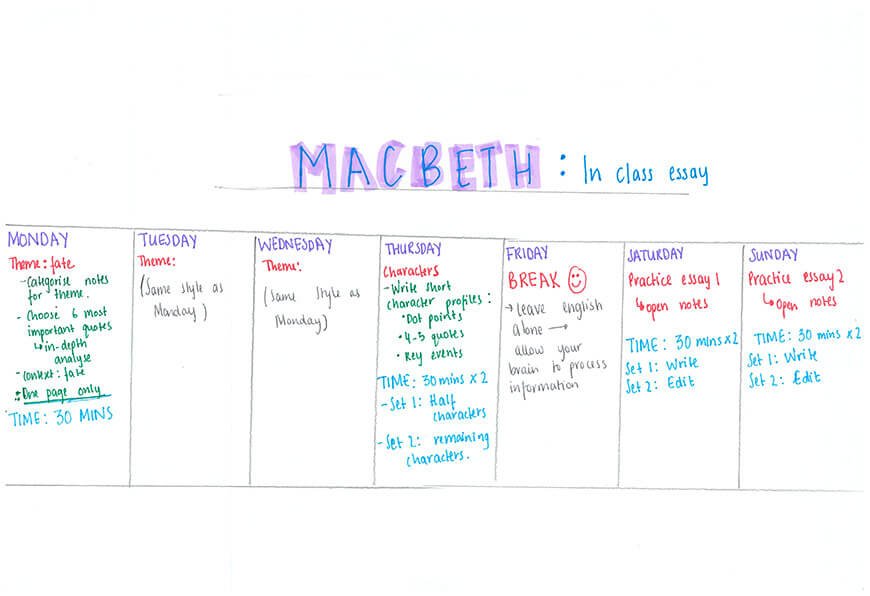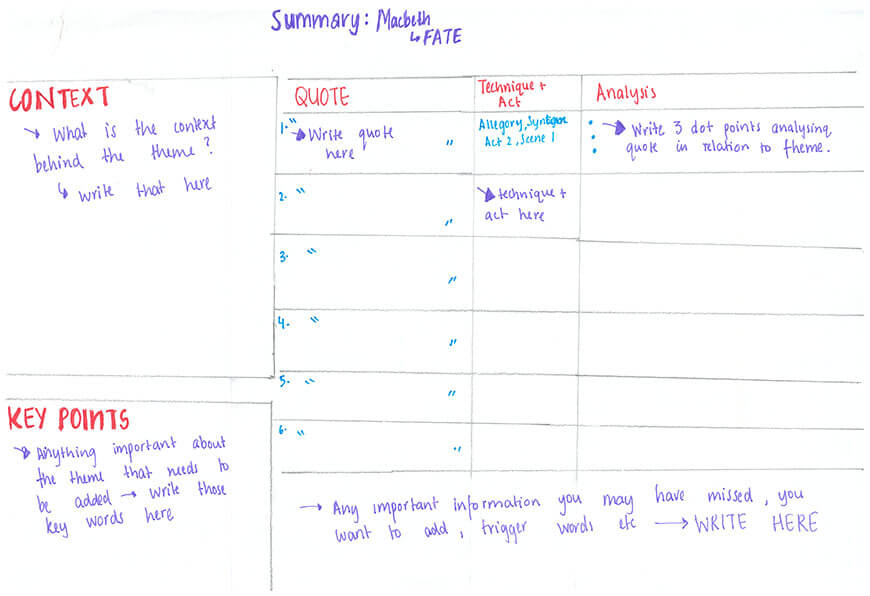Welcome to Matrix Education
To ensure we are showing you the most relevant content, please select your location below.
Select a year to see courses
Learn online or on-campus during the term or school holidays
Learn online or on-campus during the term or school holidays
Learn online or on-campus during the term or school holidays
Learn online or on-campus during the term or school holidays
Learn online or on-campus during the term or school holidays
Learn online or on-campus during the term or school holidays
Learn online or on-campus during the term or school holidays
Get HSC exam ready in just a week
Select a year to see available courses
Science guides to help you get ahead
Science guides to help you get ahead

Guide Chapters
What’s your process for studying for English? Do any of these sound like your English exam skills:
“I’ll wing it.”
“I’ll just write an essay two days before the exam and memorise it. Easy.”
“It’s English; I can just rote learn it.”
We hear these common statements from Stage 5 (Years 9 and 10) students far too often when we ask them how they will study for their Year 10 English exams.
However, “winging” it does not work and just gets you stressed.
We understand that it can be tricky to develop strong exam skills for English. So, we have developed this guide to increase your ease of studying and to take the pressure off you by giving you our strategies.
Let’s get you exam ready!
Exam skills are the techniques that will you help improve performance, reduce stress and make exams more enjoyable!
Having good exam skills sets you up for success. They allow you to perform to the best of your ability.
Studies show that having good exam skills reduces the fear of exams.
Good exam skills form the basis of a well-written response and can improve your performance. They can be the difference between a B and an A.
One common mistake is not planning your study.
Not planning your study can mean you study the same content twice, spend extra time when you sit down to study to figure out what you should be doing. This will lead to you getting overwhelmed and stressed.
Planning your study before beginning your exam preparation will help you avoid this:
How to plan your study?
Because we are humans, our attention span is small. To accommodate for this and study effectively, plan your study so it is in blocks of 30 minutes.
Here is an example of a timetable for a week of studying:

Over the term, you would have made notes in class and your teacher/ tutor would have provided you with resource material.
Problem: We often lose resources and notes because we have so many.
Solution: Spend 30 minutes to collect all your resources and place them in one folder. Then, write down a list of all the resources you have so you can refer back to it as we go through the next steps.
Title the resources that are the most important as IMPORTANT NOTES. This will ensure you don’t forget them when revising.
Now that you have collected your notes and know all the resources you have available- it’s time to get the colourful pens and highlighters out!
Remember the study planner we made? We are going to colour code the notes according to the tasks set out for Monday.
For example- on Monday, we have to focus on the theme; fate.
We recommend having sticky notes handy to mark anything that is important or you may forget.

Once you have colour coded the most important information, it is time to put it into one succinct sheet of paper per topic.
One of the most common mistakes we make is thinking that we need to remember or revise every piece of information we were given. But this doesn’t work; our brains can only retain so much.
Hence, it’s time to get a blank sheet of paper, pens and the colour coded notes for one topic and cut it down.
How do you cut it down?

Following these steps will allow you to:
Ever heard yourself saying:
“I am so tired of studying English.”
“Everything is starting to look the same.”
Losing motivation is so common whilst studying and it can really be hard to stay focused.
Learning should be enjoyable and not a task.
What do you do when the exhaustion hits and the motivation goes away?
The most important thing is to leave your room and leave all digital screens in that room.
This will give you time to refresh and reset your brain, process everything you have gone over so far and just relax.
Rewards give you something to look forward to- we all love a prize when we get to the finish line!
Practice makes perfect! It may be overused, but it is true!
The last exam skill to master is practising. I cannot stress it enough practice is essential.
It allows you to:
Every time you write a response and edit it, you become aware of things you can improve. After all, we are our harshest critics!
Trying to write under exam conditions can be stressful! Practice helps ease that stress.
We recommend:
When practising an essay, spend equal time on writing and editing.
It is key to read over what you have written and edit it. This will help you:
On the day of the exam, it is completely normal to feel nervous and feel that you haven’t studied enough.
However, it is crucial to manage these nerves and not let them get in the way of you from doing well.
The three steps we recommend for controlling nerves are:
Opt for a glass of juice or milk, with some eggs, toast and fruit!
This will energise you and ensure you do not feel hungry whilst in the exam.
Nature is great for clearing your mind and calming down.
You’ve done the study and followed the process. You’ve got this.

It is so tempting to spend three hours in the morning before an exam cramming.
DON’T!
This will only stress you out and bring out nerves. Only spend 20 minutes revising on the day of the exam.
In those 20 mins, spend no more than 5 minutes per topic. This is just a quick skim of notes, not a detailed cramming session!
An hour before the exam- leave your notes alone and take a walk or just laugh with your friends.
Going into the exam with a positive attitude will motivate you to do your best and ensure you feel at ease.
It may look crazy but the hour before the exam, keep a smile on your face! This will feel silly but it will calm you down and give you something else to focus on other than the exam.
Most importantly, trust yourself before entering the exam. You’ve done the work. You got this!
Reading time isn’t time to let your mind wander or take a quick nap. It is to plan your process of attack and understand the questions.
Use the reading time to read the question twice, understand what it means and think of key things that you would want to include in the response. Think of reading time as mind mapping but in your mind. If there is a comprehension passage, use the reading time to read it. Try to answer the comprehension questions in your head so when reading time finishes you can be efficient.
Read all the questions carefully, thoroughly and twice.
Now that the teacher has said “you can begin writing”, it’s time to plan your answer.
Spend 45-90 seconds per question to plan your long answers. Outline the structure of your response at the top of the paper or on a spare sheet- write down trigger words.
Once you have done this; begin writing.
“Manage your time effectively,” is one of those statements that’s thrown around a lot.
It is key to manage your time effectively whilst in an exam.
Here are some ways to do it:
Why? When you set your watch five minutes ahead, whilst in a pressure situation you will unconsciously think you have five fewer minutes. This will make you work faster and harder to finish on time, with spare time which you can use to edit and go over anything you may have missed.
This will build momentum. Then work from the highest marks on offer to the lowest.
This breaks up your train of thought and can jumble up your answers. Going back and forth is also time-consuming.

Our brains think much faster than we can write.
Thus, it’s common to jumble two words into one, miss key sentences, have grammatical errors and skip half a sentence whilst writing.
Editing your work can help you spot these mistakes and fix them, maximising your marks!
Remember how we set our clock five minutes ahead? This is when that comes handy. Use the extra five minutes to read your work and fix any errors that you may have made.
Editing your work can improve its quality and ensure everything makes sense. Making mistakes whilst writing under pressure is really common, but fixing those small careless errors can boost marks.
Teachers also appreciate when a student has tried to edit their work: it shows excellent time management!
Firstly, do not panic!
When you are running out of time, the worst thing to do is panic.
Instead, take three deep breaths, have water and reset.
Once you have done that, start with the thing you find the easiest and work through that first. Make sure you watch the clock! Leave the most difficult or challenging thing to the end.
Avoid wasting time by trying to tackle a hard concept first.
Remember, getting the first 50% of marks for a question is relatively easy. if you don’t attempt the question, you don’t get any of those marks.
Gradually increase difficulty. By doing this, you can maximise marks and be efficient. You want to have plenty of time up your sleeve to tackle the big bad question.
Whilst writing, be more concise and cut out anything that is not adding meaning: this will save a lot of time and allow you to finish the exam with time to edit.
Whilst in the exam, stay relaxed, take deep breathes and do your best!
If you are unsure of something, move on and come back to it later.
Do not spend time dwelling on one thing: work through what is the easiest first and slowly increase the difficulty.
This will give you a stride, pump you up and inspire your writing for the difficult parts.

Following these exam skills will help you to boost marks, increase productivity and reduce stress.
Don’t just wing it, ace it!
© Matrix Education and www.matrix.edu.au, 2023. Unauthorised use and/or duplication of this material without express and written permission from this site’s author and/or owner is strictly prohibited. Excerpts and links may be used, provided that full and clear credit is given to Matrix Education and www.matrix.edu.au with appropriate and specific direction to the original content.